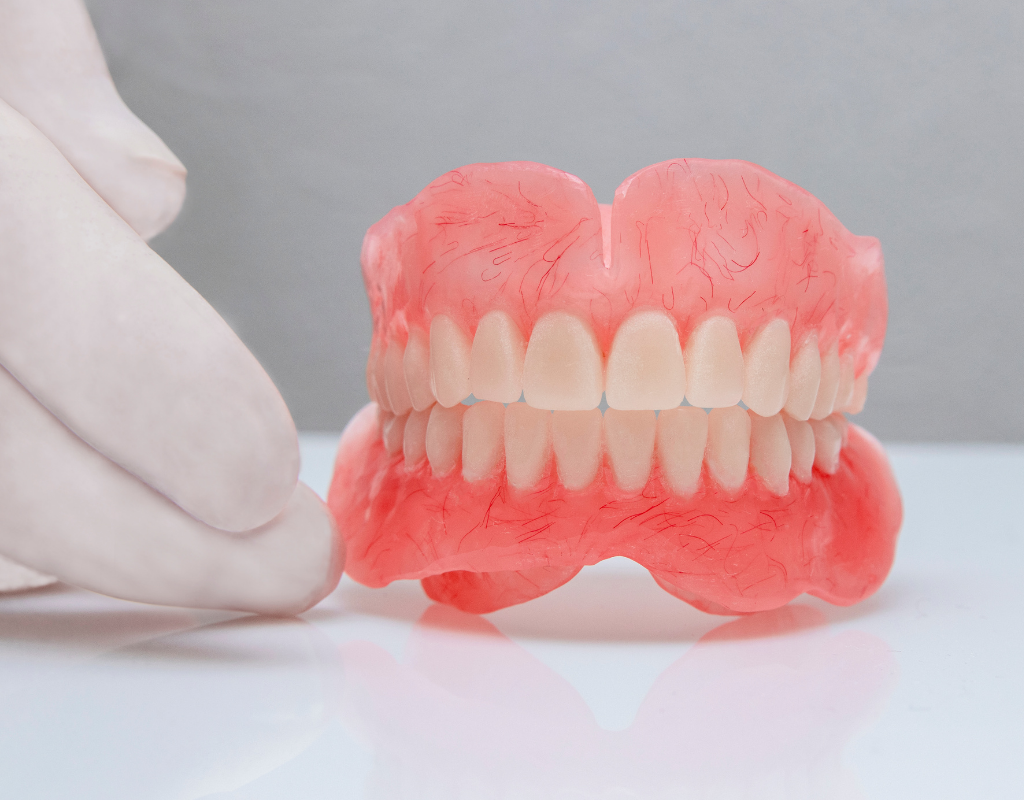Types of Dentures
Partial Dentures : Partial dentures are used when a person still has some of their natural teeth remaining. They consist of replacement teeth attached to a base made of acrylic or metal, which matches the color of the gums. Partial dentures are held in place by clasps that anchor onto the natural teeth, providing stability and functionality.
Complete Dentures : Complete dentures are utilized when all natural teeth are missing, either in the upper or lower jaw, or both. They consist of a full set of artificial teeth set in an acrylic base that mimics the appearance of gums. Complete dentures are customized to fit the patient’s mouth precisely and are held in place through suction or the use of denture adhesive.
Materials and Fitting
✓ Acrylic Resin : Acrylic resin is a common material for denture bases due to its durability, lightweight nature, and ability to match the color of the gums. It can be easily adjusted and repaired if necessary.
✓ Metal Framework : Some partial dentures incorporate a metal framework, often made of cobalt-chromium or other metals, to provide additional strength and stability. Metal frameworks are less bulky, making them more comfortable for the wearer.
✓ Initial Examination : The dentist conducts a thorough examination of the patient’s mouth, including impressions, X-rays, and measurements to determine the appropriate type of denture and design.
✓ Impressions : Dental impressions are molds of the patient’s mouth made using dental putty or a digital scanner to ensure precise measurements for the denture.
✓ Bite Registration : Bite registration involves recording the way the upper and lower teeth come together to ensure a proper and comfortable bite with the new dentures.
Maintenance and Care
Proper maintenance and care of dentures are essential to ensure their longevity, functionality, and oral hygiene. Here are some key aspects of denture maintenance and care:
Daily Cleaning
Soaking
Handling with Care
Regular Check-ups
Avoiding Harsh Substances
Mouth and Gum Care
Avoiding Hot Water
Maintaining Proper Fit
Operation Process
How is the process progressing?
- 1
Select Operation
Choose what you need from the services we provide.
- 2
Fill the form
Fill in your information requested
in the form. - 3
Let's Get Back to You
Let us contact you according to the information provided.
Frequently asked questions
We now have an FAQ list that we hope will help you answer some of the more common ones.
What are dentures?
Dentures are removable prosthetic devices used to replace missing teeth and surrounding tissues.
What are the two main types of dentures?
The two main types of dentures are partial dentures and complete dentures.
When are partial dentures used?
Partial dentures are used when a person still has some of their natural teeth remaining.
When are complete dentures used?
Complete dentures are used when a person has lost all of their natural teeth in either the upper or lower jaw, or both.
How are dentures fitted to a person's mouth?
Dentures are custom-fitted to a person’s mouth through impressions, measurements, and trial fittings.
What are dentures typically made of?
Dentures are typically made of acrylic resin for the base and either acrylic, porcelain, or other materials for the teeth.
How should dentures be cleaned and maintained?
Dentures should be cleaned daily using a soft-bristled toothbrush or denture brush, and soaked in a denture-cleaning solution or water overnight.
Are adjustments to dentures common?
Yes, adjustments to dentures are common to ensure a comfortable fit as the shape of the mouth and jaw may change over time.
Can dentures affect speech and eating habits?
Initially, dentures may affect speech and eating habits, but with practice and adjustments, most individuals adapt and regain normal functions.
How often should dentures be replaced?
Dentures should be evaluated regularly by a dentist and replaced when they no longer fit well, are visibly worn, or are causing discomfort. Typically, they may need replacement every 5 to 10 years.


